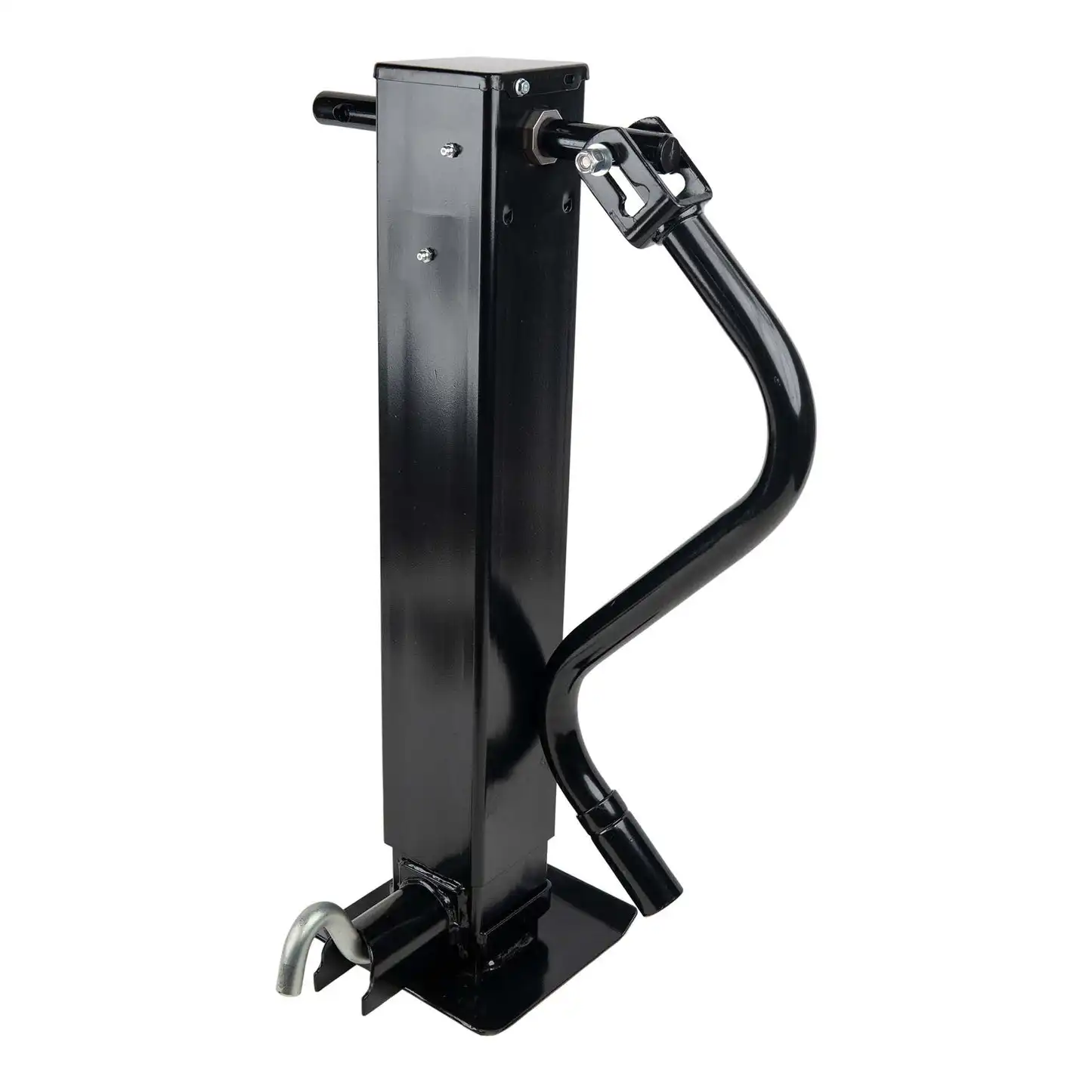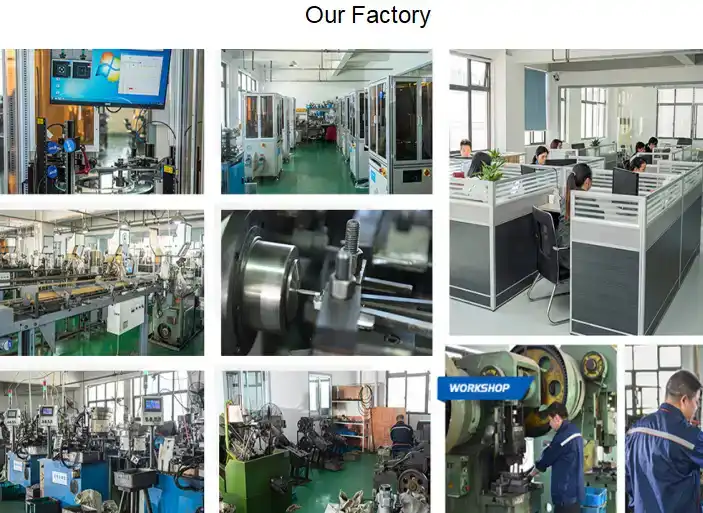How much weight can a trailer jack hold?
2025-10-09 16:33:01
Picture this: you're standing in your driveway with a loaded trailer, ready for a weekend adventure, but your current trailer jack is struggling to lift the tongue. The safety concern hits immediately - what if it fails completely? Understanding trailer jack weight capacity isn't just about convenience; it's about preventing dangerous situations that could damage your trailer, vehicle, or worse, cause injury. As a general rule, a tongue jack should be capable of lifting at least 10% and preferably 15% of your trailer weight, but the reality is more complex. A proper heavy duty trailer jack selection depends on multiple factors including trailer type, load distribution, and safety margins that every trailer owner must understand.

Understanding Heavy Duty Trailer Jack Weight Capacities
When evaluating how much weight a trailer jack can hold, it's essential to understand that manufacturers typically provide two different ratings: static weight capacity and operational weight capacity. The static rating represents the maximum weight the jack can support when stationary and fully extended, while the operational rating indicates the weight it can safely lift and lower during normal use. For example, if you have a 10,000-pound static-rated utility trailer jack, it will handle lifting 5,000 pounds in its operational state. This distinction is crucial because many trailer owners mistakenly assume the static rating applies to lifting operations, which can lead to equipment failure and safety hazards. Heavy duty trailer jacks typically range from 2,000 pounds to 10,000 pounds in static capacity, with operational capacities being approximately 50% of the static rating. Professional-grade units manufactured with high-quality steel construction and precision engineering can handle the demanding requirements of commercial applications. The Trailer Jack Foot Plate plays a critical role in weight distribution, as a larger foot plate spreads the load more effectively across the ground surface, preventing sinking and providing better stability during operation.
-
Calculating Your Trailer's Tongue Weight Requirements
The fundamental principle for determining the appropriate heavy duty trailer jack capacity begins with calculating your trailer's tongue weight accurately. For a boat trailer jack, the tongue weight should be about 7-10% of the weight of the fully-loaded trailer. For example, if your loaded trailer weighs 6000lb, you will need a trailer jack with a weight capacity of 420lbs to 600lbs for a boat trailer and about 900lbs for others. However, this calculation represents the minimum requirement, and safety experts recommend selecting a jack with at least 25-30% additional capacity beyond your calculated tongue weight. Different trailer types have varying tongue weight percentages due to their design and intended load distribution. Travel trailers and RVs typically require 10-15% tongue weight, while utility trailers may need 10-12%, and boat trailers often operate effectively with 7-10%. The key is to weigh your fully loaded trailer at a certified scale, then multiply by the appropriate percentage for your trailer type. Remember that tongue weight can vary significantly based on how you load your trailer, with improperly distributed cargo potentially increasing tongue weight beyond safe limits for your heavy duty trailer jack.
Types of Heavy Duty Trailer Jacks and Their Weight Limits
Manual heavy duty trailer jacks represent the most common and cost-effective option for many trailer applications. These units typically feature a side-wind or top-wind crank mechanism and can handle static loads ranging from 2,000 to 6,000 pounds. The advantage of manual jacks lies in their simplicity, reliability, and lower cost, but they require significant physical effort to operate, especially with heavier loads. Quality manual jacks incorporate robust gear systems that provide mechanical advantage, making it easier to lift heavy tongue weights while maintaining precise control over positioning. Electric heavy duty trailer jacks offer convenience and ease of operation, particularly valuable for frequent users or those with mobility limitations. These units typically handle similar weight capacities as manual versions but accomplish lifting and lowering with the push of a button. Electric jacks require a 12-volt power source and incorporate safety features like automatic shut-off when fully extended or retracted. The Trailer Jack Foot Plate design becomes even more critical with electric units, as they often cycle faster and require stable ground contact to prevent binding or damage to the motor assembly.
-
Hydraulic Trailer Jack Systems for Maximum Capacity
Hydraulic heavy duty trailer jacks represent the premium solution for extremely heavy applications, capable of handling static loads exceeding 10,000 pounds. These systems utilize hydraulic principles to multiply force, allowing operators to lift massive tongue weights with minimal physical effort. Commercial trucking operations, heavy equipment transport, and large RV applications frequently employ hydraulic systems due to their superior lifting capacity and precise control characteristics. The installation and maintenance requirements for hydraulic systems are more complex than manual or electric alternatives, requiring proper hydraulic fluid levels, seal maintenance, and periodic system bleeding. However, the investment pays dividends in applications where extreme weight capacity and operational efficiency are paramount. Quality hydraulic jacks manufactured by reputable companies like those following ISO certification standards ensure reliable performance and longevity under demanding conditions.
Material Construction and Weight Capacity Relationship
The material composition of a heavy duty trailer jack directly impacts its weight capacity and operational longevity. High-grade steel construction, particularly when manufactured in facilities with advanced metallurgy capabilities like those in Qingdao, China, provides the structural integrity necessary for heavy-duty applications. Steel composition, heat treatment processes, and manufacturing precision all contribute to the final weight capacity rating of the jack assembly. Surface treatments such as powder coating, galvanizing, or specialized protective finishes not only enhance corrosion resistance but also contribute to structural integrity by preventing material degradation over time. The Trailer Jack Foot Plate construction deserves particular attention, as this component bears the concentrated load and must distribute it effectively across the ground surface. Stamped steel foot plates offer adequate performance for moderate applications, while heavy-duty cast or machined plates provide superior strength for maximum weight applications.
-
Engineering Standards and Safety Factors
Professional heavy duty trailer jack manufacturers incorporate substantial safety factors into their weight capacity ratings, typically designing units to handle 2-3 times their rated operational capacity before failure. This engineering margin accounts for dynamic loading, shock forces, uneven ground conditions, and normal wear over the product's service life. ISO-certified manufacturing processes ensure consistent quality and adherence to international safety standards, providing users with confidence in published weight ratings. The precision manufacturing capabilities available through advanced production facilities, including CNC machining, laser cutting, and robotic welding, enable the production of heavy duty trailer jacks with tight tolerances and superior structural integrity. These manufacturing advantages translate directly into higher weight capacities and longer service life, making them particularly valuable for commercial and frequent-use applications.

Installation and Maintenance Factors Affecting Weight Capacity
Proper installation of a heavy duty trailer jack significantly impacts its effective weight capacity and operational safety. The mounting method, whether bolt-on, weld-on, or clamp-on, must provide adequate strength to transfer loads from the jack to the trailer frame without deformation or failure. Trailer frame dimensions and wall thickness must be compatible with the jack mounting requirements, and reinforcement may be necessary for lighter-duty trailer frames when upgrading to higher-capacity jacks. The Trailer Jack Foot Plate positioning and ground conditions play crucial roles in achieving rated weight capacity. Soft or uneven ground can cause the foot plate to sink or tilt, reducing the jack's effective lifting capacity and potentially causing dangerous instability. Using a solid base plate or paving stone beneath the foot plate distributes the load more effectively and ensures stable operation. Regular maintenance including lubrication of moving parts, inspection of mounting hardware, and verification of proper operation helps maintain the jack's full weight capacity throughout its service life.
-
Ground Conditions and Operational Environment
Environmental factors significantly influence the practical weight capacity of heavy duty trailer jacks. Soft soil, gravel, or uneven surfaces can reduce effective capacity by 20-30% compared to operations on solid, level ground. Cold weather affects lubrication viscosity and material properties, potentially reducing operational capacity, while exposure to salt water or corrosive environments can degrade components over time if not properly protected. Professional applications often require consideration of repetitive loading cycles, as frequent operation can cause fatigue in jack components. Heavy duty trailer jacks designed for commercial use incorporate features like sealed bearings, premium lubricants, and reinforced stress points to maintain capacity under demanding operational conditions. The selection process should account for the specific environmental conditions and usage patterns expected in your application.
Selecting the Right Heavy Duty Trailer Jack for Your Needs
Choosing the appropriate heavy duty trailer jack requires careful consideration of multiple factors beyond simple weight capacity. The mounting style must be compatible with your trailer's A-frame or tongue design, while the jack's travel distance must provide adequate lifting range for your specific application. Consideration of future trailer modifications or load changes should influence the selection toward higher capacity units that provide operational flexibility. Quality heavy duty trailer jack manufacturers offer comprehensive product lines covering various capacity ranges and feature combinations. Professional manufacturers located in major industrial centers like Qingdao, China, leverage advanced manufacturing capabilities and quality control systems to produce units that consistently meet or exceed their published specifications. The availability of customization options allows users to specify features like extended travel, special mounting configurations, or enhanced corrosion protection for unique applications.
-
Professional Consultation and Technical Support
Working with experienced heavy duty trailer jack suppliers provides access to technical expertise that can guide proper selection and installation. Professional suppliers maintain comprehensive product databases and can recommend specific units based on your trailer specifications, loading requirements, and operational conditions. This consultation process helps avoid common selection errors that can result in inadequate capacity, installation problems, or premature failure. Technical support extends beyond initial selection to include installation guidance, maintenance recommendations, and troubleshooting assistance. Suppliers with extensive manufacturing experience and broad product knowledge can provide valuable insights into optimizing your trailer jack system for maximum performance and longevity. The investment in professional consultation often pays dividends in improved safety, reduced maintenance costs, and extended equipment life.

Conclusion
Understanding trailer jack weight capacity involves calculating your trailer's tongue weight requirements, selecting the appropriate jack type and capacity, and ensuring proper installation and maintenance practices. The key is choosing a heavy duty trailer jack with adequate capacity margin, quality construction, and compatibility with your specific trailer and operational requirements for safe, reliable performance.
Cooperate with Qingdao RUIRUI Machinary Co., LTD.
As a China heavy duty trailer jack factory established in 2016, Qingdao RUIRUI Machinary Co., LTD. specializes as a China heavy duty trailer jack supplier and China heavy duty trailer jack manufacturer offering comprehensive trailer hardware solutions. Our China heavy duty trailer jack wholesale capabilities include heavy duty trailer jack for sale at competitive heavy duty trailer jack price points, supported by High Quality heavy duty trailer jack manufacturing utilizing advanced CNC machining, laser cutting, and progressive stamping technologies.
Our ISO-certified facility features eight production lines with 130,000 pieces annual output capacity, delivering customized Trailer Jack Foot Plate solutions with 8-26 days delivery time. With over 15 years of management experience and automated robot production lines, we provide OEM support, technical consultation, and professional packaging. Whether you need standard units or custom specifications, our experienced R&D team delivers innovative solutions backed by comprehensive after-sales service. Contact us at info@qdkshd.com for technical support and competitive pricing on your heavy duty trailer jack requirements.
FAQ
Q: What is the typical weight capacity range for heavy duty trailer jacks?
A: Heavy duty trailer jacks typically range from 2,000 to 10,000 pounds static capacity, with operational capacity being approximately 50% of static rating.
Q: How do I calculate the required tongue weight for my trailer jack selection?
A: Calculate 10-15% of your fully loaded trailer weight for most applications, with boat trailers requiring 7-10% and utility trailers needing 10-12%.
Q: What's the difference between static and operational weight capacity?
A: Static capacity is the maximum weight the jack can support when stationary, while operational capacity is the weight it can safely lift during use.
Q: Do ground conditions affect trailer jack weight capacity?
A: Yes, soft or uneven ground can reduce effective capacity by 20-30% compared to solid, level surfaces, requiring larger foot plates or base support.
References
1. "Trailer Tongue Weight Distribution and Safety Guidelines" - Society of Automotive Engineers Technical Standards Committee
2. "Heavy Duty Trailer Jack Design and Manufacturing Specifications" - American National Standards Institute Trailer Equipment Division
3. "Load Capacity Analysis for Mechanical Lifting Devices" - International Organization for Standardization Technical Committee
4. "Trailer Safety Equipment Performance Standards" - National Highway Traffic Safety Administration Commercial Vehicle Division
Send Inquiry
You may like
